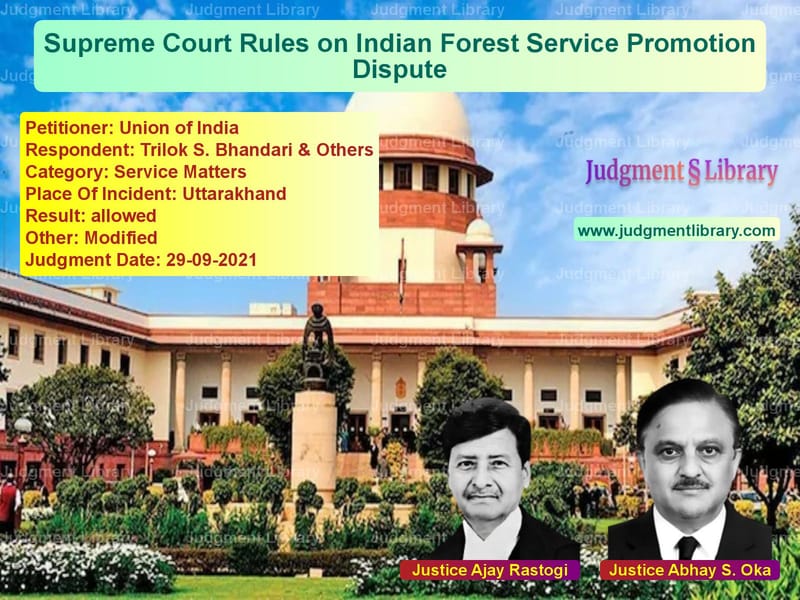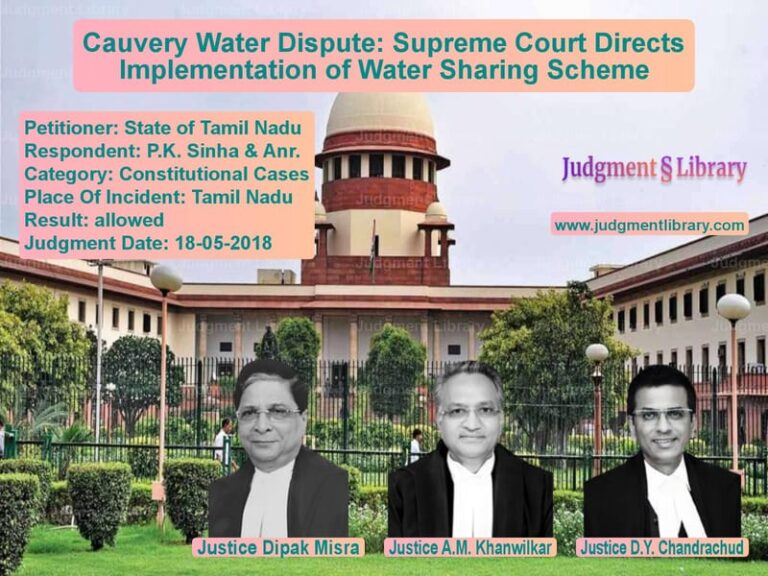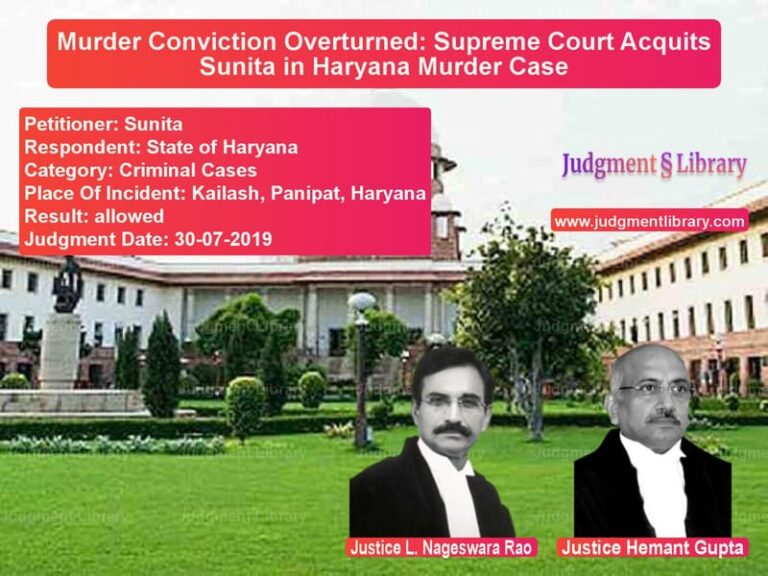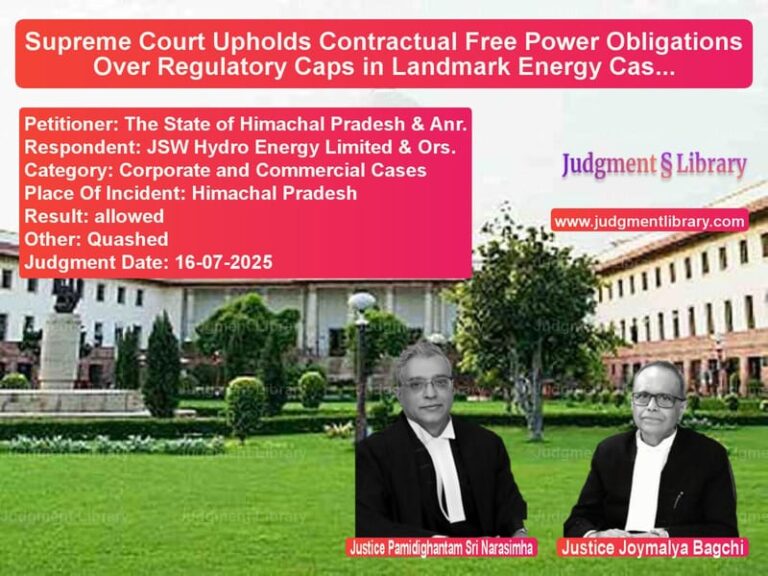Supreme Court Rules on Indian Forest Service Promotion Dispute
The Supreme Court of India recently delivered an important ruling in the case of Union of India vs. Trilok S. Bhandari & Others, addressing a long-standing dispute over promotions in the Indian Forest Service (IFS). The case revolved around the legality of clubbing vacancies for promotions and the subsequent adjustments of officers affected by a review process.
Background of the Case
The dispute originated from the promotion of officers to the IFS cadre in the Uttar Pradesh cadre. The State Forest Service members were promoted based on vacancies spanning several years (1984–1996). However, a legal challenge was mounted, arguing that the clubbing of vacancies over multiple years was in violation of the Indian Forest Service (Appointment by Promotion) Regulations, 1966.
The Central Administrative Tribunal (CAT) ruled that vacancies should have been considered year-wise, leading to a review of promotions. This review process resulted in certain officers, including Trilok S. Bhandari, being left out of the final selection list. The affected officers challenged this outcome before the Uttarakhand High Court, which ruled in their favor and directed their adjustment with pensionary benefits. The Union of India subsequently appealed this decision in the Supreme Court.
Arguments by the Petitioner (Union of India)
- The review process, conducted following CAT’s order, was legally valid and in compliance with the regulations.
- Clubbing vacancies for promotions violated Regulation 5 of the IFS Promotion Rules, and the necessary corrective action had already been taken.
- The officers who were not selected in the review process had no legal right to claim IFS status.
- The High Court’s order directing adjustments was beyond its jurisdiction and conflicted with the principle of merit-based selection.
Arguments by the Respondents (Trilok S. Bhandari & Others)
- The respondents had already been promoted in 1996 based on the earlier selection process, and their exclusion from the review process was arbitrary.
- The High Court was justified in directing the government to adjust them against notional vacancies, considering the principles of fairness and natural justice.
- The affected officers had served in the IFS cadre and should not be penalized due to administrative errors.
- The case was similar to Union of India vs. Vipinchandra Hiralal Shah, where the Supreme Court had previously directed adjustments for affected officers.
Supreme Court’s Analysis and Judgment
On the Validity of Review Selection
“The review selection process conducted in 2005 and 2006 was never challenged by the respondents. Therefore, the High Court had no basis to interfere with the outcome.”
The Supreme Court held that since the officers had not formally challenged the review process, they could not later claim a right to adjustments based on its outcome.
On High Court’s Jurisdiction
“The High Court exceeded its jurisdiction by granting relief beyond the legal framework and without challenging the review selection committee’s recommendations.”
The Court emphasized that judicial intervention in administrative decisions must be limited to cases of clear legal violations.
On the Relief Granted to Respondents
“The officers who were not selected in the review process have no vested right to IFS status. However, considering the peculiar circumstances, we exercise our power under Article 142 to protect the pensionary benefits of the affected officer.”
While the Supreme Court overturned the High Court’s ruling, it exercised its extraordinary jurisdiction under Article 142 of the Constitution to allow the affected officer (Respondent No. 13) to retain pensionary benefits.
Final Judgment
The Supreme Court quashed the Uttarakhand High Court’s order but directed the authorities to treat the affected officer as a de facto IFS member for pension purposes:
“The appeal succeeds. The judgment of the High Court is set aside. However, the concerned officer shall be treated as an IFS officer for pensionary calculations.”
Implications of the Judgment
- Reaffirms Promotion Rules: The ruling clarifies that clubbing of vacancies for promotion is not permissible.
- Limits Judicial Overreach: The judgment reinforces that courts should not interfere with administrative decisions unless there is a clear violation of law.
- Protects Pension Rights: The use of Article 142 ensures that the affected officer does not suffer undue hardship.
- Sets a Precedent: The decision will impact future disputes regarding selection and review processes in government services.
Conclusion
The Supreme Court’s decision in this case reinforces the importance of following proper selection procedures while ensuring fairness for affected employees. By upholding the review selection process and protecting pensionary rights, the Court has struck a balance between legal principles and humanitarian considerations.
Petitioner Name: Union of India.Respondent Name: Trilok S. Bhandari & Others.Judgment By: Justice Ajay Rastogi, Justice Abhay S. Oka.Place Of Incident: Uttarakhand.Judgment Date: 29-09-2021.
Don’t miss out on the full details! Download the complete judgment in PDF format below and gain valuable insights instantly!
Download Judgment: union-of-india-vs-trilok-s.-bhandari-&-supreme-court-of-india-judgment-dated-29-09-2021.pdf
Directly Download Judgment: Directly download this Judgment
See all petitions in Promotion Cases
See all petitions in Pension and Gratuity
See all petitions in Judgment by Ajay Rastogi
See all petitions in Judgment by Abhay S. Oka
See all petitions in allowed
See all petitions in Modified
See all petitions in supreme court of India judgments September 2021
See all petitions in 2021 judgments
See all posts in Service Matters Category
See all allowed petitions in Service Matters Category
See all Dismissed petitions in Service Matters Category
See all partially allowed petitions in Service Matters Category







